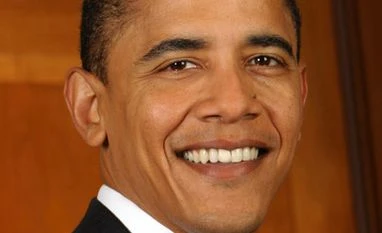US President Barack Obama said he would consult key European leaders later today on the failed agreement to ease tensions in Ukraine and on imposing new sanctions against Russia.
Obama said in Seoul that he wanted to coordinate a united approach with Western US allies, after Washington concluded that Russia had done nothing to implement the deal reached in Geneva.
"I will be talking to the Europeans, not all of them, but some key European leaders again this evening, making sure they share my assessment in terms of what has happened since the Geneva talks," Obama said at a press conference in Seoul.
In Germany, Chancellor Angela Merkel's spokesman said she would be on the conference call after speaking to Russian President Vladimir Putin earlier in the day.
Obama has also worked extensively with British Prime Minister David Cameron and French President Francois Hollande on the situation in Ukraine.
Obama however signalled that the new sanctions, widely expected to be imposed on Russia within days, would not involve an attempt to target key areas of the Russian economy, including the mining and energy sectors.
US officials have said those measures would only be considered if Russia sent its regular forces across the border into eastern Ukraine.
"We will continue to keep some arrows in our quiver," Obama said.
The coming toughened sanctions could bite deeper into Putin's inner circle by hitting prominent Russian businessmen who have ties to the president with travel and visa bans.
Earlier, in Washington, Secretary of State John Kerry warned Russia not to make an "expensive" mistake, in what US officials said was a last appeal to Russia to implement the Geneva deal reached between Washington, Moscow, Ukraine and the European Union.
He said Moscow had sabotaged the deal reached last week by supporting pro-separatist militias inside eastern Ukraine -- weeks after annexing Crimea.
Obama will conduct the conference call with European allies from the road in South Korea on the second leg of a four-nation Asian tour overshadowed by the worst East-West showdown since the Cold War.
Obama said in Seoul that he wanted to coordinate a united approach with Western US allies, after Washington concluded that Russia had done nothing to implement the deal reached in Geneva.
"I will be talking to the Europeans, not all of them, but some key European leaders again this evening, making sure they share my assessment in terms of what has happened since the Geneva talks," Obama said at a press conference in Seoul.
More From This Section
The president said Washington had already lined up further targeted sanctions against Russia "that are ready to go".
In Germany, Chancellor Angela Merkel's spokesman said she would be on the conference call after speaking to Russian President Vladimir Putin earlier in the day.
Obama has also worked extensively with British Prime Minister David Cameron and French President Francois Hollande on the situation in Ukraine.
Obama however signalled that the new sanctions, widely expected to be imposed on Russia within days, would not involve an attempt to target key areas of the Russian economy, including the mining and energy sectors.
US officials have said those measures would only be considered if Russia sent its regular forces across the border into eastern Ukraine.
"We will continue to keep some arrows in our quiver," Obama said.
The coming toughened sanctions could bite deeper into Putin's inner circle by hitting prominent Russian businessmen who have ties to the president with travel and visa bans.
Earlier, in Washington, Secretary of State John Kerry warned Russia not to make an "expensive" mistake, in what US officials said was a last appeal to Russia to implement the Geneva deal reached between Washington, Moscow, Ukraine and the European Union.
He said Moscow had sabotaged the deal reached last week by supporting pro-separatist militias inside eastern Ukraine -- weeks after annexing Crimea.
Obama will conduct the conference call with European allies from the road in South Korea on the second leg of a four-nation Asian tour overshadowed by the worst East-West showdown since the Cold War.
)